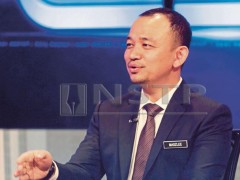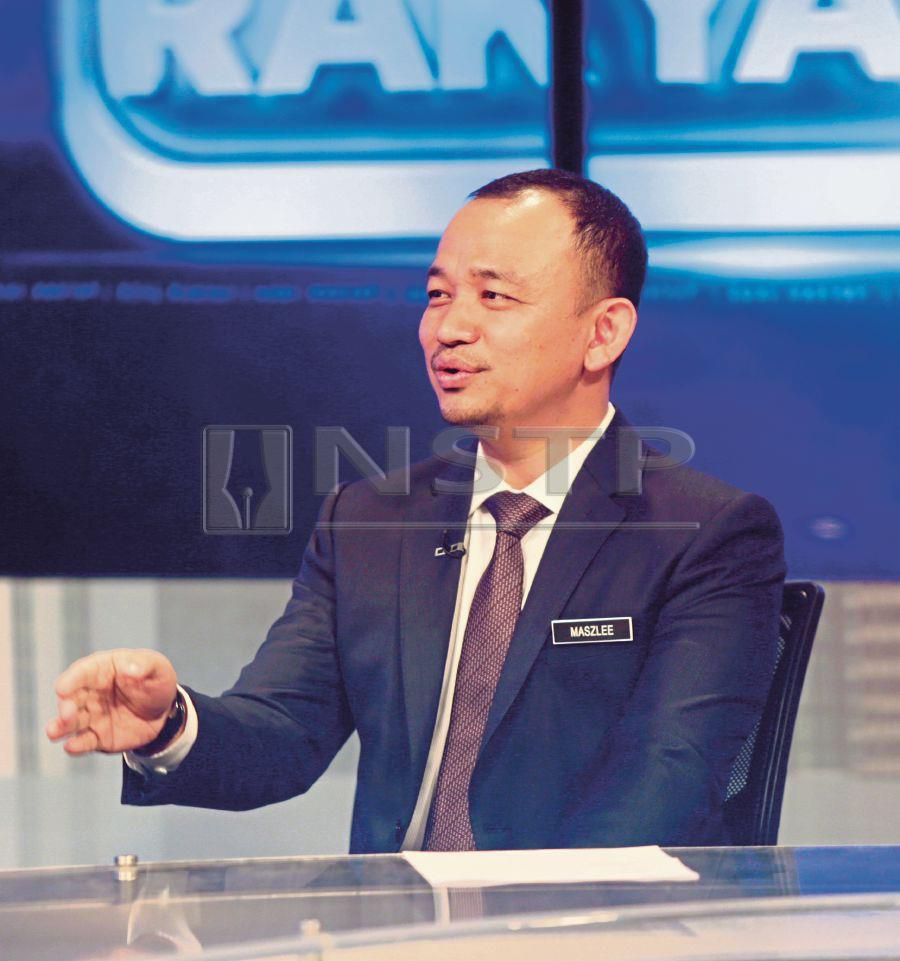Berita

Maszlee: I may be too humble about my contributions
Tarikh : 21 October 2018
Dilaporkan Oleh : dsh
Kategori : News
Tweet This
- October 21, 2018 @ 8:48am
SINCE becoming education minister, Simpang Renggam MP Dr Maszlee Malik has courted controversy, including the issues of black shoes in schools, the colour of students’ socks and his appointment as IIUM president. Hazana Kassim and Ally Iskandar Mohd Mardzi speak to him on TV3’s ‘Soal Rakyat’ programme
Question: Before going into politics, you were active in academia. Is that what you wanted to do since young?
Answer: That is God’s gift to me. I can’t see myself excelling anywhere else. Many of my friends became doctors, actors, musicians and sportsmen, but I am more into reading, analysing, acquiring knowledge and communicating. That’s my strength, which allows me to serve the people.
Q: In some of your writings, you said public political awareness does not necessarily mean having to venture into politics. But in your case, it is the other way around, isn’t it?
A: It’s like this. “Citizen politics” is the political consciousness of every citizen to be involved in making decisions without having to join partisan politics and becoming a politician. I admit I am more comfortable there. But the 14th General Election in May pushed us into partisan politics to effect a change in government. It became a sacrifice.
Q: Initially, Prime Minister Tun Dr Mahathir Mohamad named himself as education minister because there was no other candidate. This was before you were appointed. Is your vision in line with the prime minister’s?
A: Firstly, you must remember it is not merely mine and Dr Mahathir’s vision. I am upholding the manifesto. This is what I strive for as it is the pledges to the people that need to be fulfilled. Malaysia is a multicultural country, with people from different backgrounds and socio-economic status, and it needs an approach based on local needs.
That is why schools will be strengthened and empowered to make their own decisions, with cooperation from the community, parents and universities.
In addition, we need to use smartphone technology in education and use it to help students, parents and teachers in education.
Instilling values in students will be re-introduced through subjects like Civic Education and this is being done.
Secondly, we will conduct a “values manual” explanation at the weekly school assembly with activities that will be done with the help of the private sector and a producer.
We will flood social media with things associated with education.
 Simpang Renggam MP Dr Maszlee Malik
Simpang Renggam MP Dr Maszlee Malik
Q: Some say your involvement in politics is more inclined towards an Islamic image, which could be misinterpreted as having a tendency towards radical elements, which is not good. What do you think of this?
A: It is up to them (people who hold this view). Maybe to some of them, Islam is only about certain forms of punishments, and not the comprehensive way of life that is Islam.
Maybe it is my openness that has made me controversial, but we are conducting discussions. We want all problems to be resolved through understanding. Our culture of education needs to be based on three elements: love, happiness and mutual respect. I regard these three elements as very vital and the harmony between them must be preserved.
We need to shape history and provide a new framework to the world community as we are facing issues such as confusion, religious and racial extremism, Islamophobia and conflicts. Everything is dealt with through war. In future, we want to make sure students from national schools are multilingual.
They can uphold and converse well in Bahasa Melayu and English, while studying a third language, be it Arabic, Mandarin, Tamil or Iban, for self-development.
Q: While in the opposition, you opposed cronyism. But now you are doing the same. How will you address this?
A: Firstly, this view is being spread by the (current) opposition. In politics, many will force others to accept their views. It is unfortunate to see that this is becoming their tagline, to the point that we cannot do anything about it.
Secondly, some perceptions are spread by certain quarters, and that is a risk we need to face in politics. The media also plays a role in the New Malaysia as it is no longer controlled.
To tackle this, we need to strengthen our contributions. Our achievements should speak for themselves. The problem is when we do many good things that do not receive media coverage. Maybe it is a weakness of my media team or that I am too humble to tell people about it, but one cannot be like that in politics.
On my appointment as International Islamic University Malaysia (IIUM) president, we know that the university is not controlled by the Universities and University Colleges Act. The act states that the minister appoints a university’s chairman. But it is not so with IIUM. The minister does not have the power to do so. If you look at its history, the education minister has been its president. Datuk Seri Anwar Ibrahim and Datuk Seri Najib Razak were appointed its president, but Netizens do not bring that up.
I was appointed president for a temporary period to put in effect changes based on Pakatan Harapan’s manifesto, which is to bring academic freedom to IIUM students and lecturers to strengthen the varsity.
IIUM is not subject to the Universities and University Colleges Act, but it has its own laws, and only its administrative board members can change those laws. These board members comprise foreign ambassadors and Malaysian representatives, who are headed by the president. I see it as an opportunity to effect quick changes that will turn it into a model university. While some people are awaiting amendments to the Universities and University Colleges Act, let IIUM become a model institution. That is why I accepted the appointment.
In the first meeting (as IIUM president), I convinced two foreign ambassadors to abolish two prohibitions meant for students that infringed their academic freedom. I also appointed a student to the university’s Senate and provided academic freedom to lecturers. But some perceive these things as being power crazy.
Q: As a new minister, what do you think about situations where politicians ‘oppose’ the media?
A: Nobody is perfect and controversies can happen to anyone. I look at it positively as a steep learning curve.
Q: The education system is seen as examination-oriented. What is your opinion?
A: Examinations have been part of people’s lives and civilisation for thousands of years. But in this education world of the 21st century, examinations are not the only way to conduct evaluations. This does not mean we need to abolish examinations.
Instead, we try to create a culture that is not based on an “examinations is everything” mentality.
Most importantly, we need to ensure that the learning process is not focused on the classroom. The world is an open platform for learning.
Wherever students go, or whatever they do, even if it is in carpentry, we want them to be the best at it.
Q: The 2019 Budget is being described as a prudent one. How will you realise your ministry’s plan with a limited budget?
A: I will not compromise when it comes to education issues. I am in contact with the finance minister to make sure there are no cuts in the education budget. It is a main component in the country’s development.
Read more: https://www.nst.com.my/news/na...








